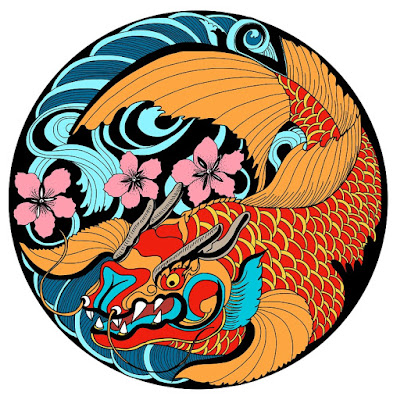Influence of Japanese Tattoo on Modern Designs
As of 2012, flaunting tattoos in the Japanese state of Osaka is a crime. The law was passed, since a lot of modern tattoos in Japan can trace their roots to the Yakuza tribe, a gang associated with criminal activities. However, tattoos were not always associated with crime in Japan. In fact, the Asian country is rich in cultural history, with tattoos being first and foremost used to exhibit societal status, and also, devotion to a certain sect. In fact, modern religious tattoo designs derive a lot from traditional Japanese images that were used to depict devotion to a certain idea, sect, or religion.
Significance of different images in Japanese tattoos
Every image used in traditional Japanese tattoos designs comes with its own significance. Dragons are perhaps the most used images in Japanese tattoos. While in the West dragons are seen as a force of evil and destruction, it is quite the opposite in Japanese culture. The east Asian country considers dragons to be guardians instead, who stand for wisdom, strength, and determination.
Tattoos featuring Koi fish are also very popular in Japanese culture. Koi tattoos actually originated in China, where they were considered a symbol of strength and determination. In fact, according to popular folklore, Koi fish swam upstream in ancient China. However, only a few fish were able to swim past a point known as the ‘dragon’s gate’. These fish were then transformed into dragons.
Phoenix tattoos are another popular Japanese tattoo design, and we continually see a lot of modern references to it. Almost every culture has a Phoenix story, and the Japanese culture is no different. Across cultures though, Phoenix stands for rebirth and triumph, which is what such a tattoo symbolizes.
Skull tattoos in modern design
We see a lot of interpretations of skulls in modern tattoo designs. Popular wisdom states that skull tattoos have a negative connotation to them, and they are generally associated with evil. However, it was not so in traditional Japanese culture. According to traditional Japanese belief, a skull denotes change, since it represents the cycle of birth and death. In fact, a lot of times, skull tattoos in Japan are drawn with flowers, which is in coherence with several customs and traditions in Japan associated with funerals and death.
 |
| Tattoo japanese |
Different flowers in Japanese tattoos have different significance.
Oni mask tattoos
A very common Japanese tattoo design is an Oni mask tattoo. A lot of modern tattoo designs in fact derive inspiration from the Oni mask, which has a dual connotation to it. While Oni is seen as evil, it is also seen as a protector of justice. According to Japanese beliefs, there is a spirit world where demons or Onis carry out their duty of punishing evil to let good prevail. At the same time, they are also responsible for spreading disease.
Thus, an Oni mask tattoo could have either significance, depending on what it is combined with. For instance, an Oni mask tattoo combined with perhaps a variation of a skull could denote change, and how that change is for the better of the world.
Water tattoos
A lot of traditional Japanese tattoos have flowing waves. These symbolize the natural ebb and flow of life, which is akin to that of water. Often, wavy tattoos are combined with mask tattoos or skull tattoos to denote that change is the only constant in life. A lot of modern designs take inspiration from these wavy Japanese tattoos, and can be a great way to denote your belief in the perfect functioning of the Universe.
If you are curious to know more about Japanese tattoos then go through this link to get additional information.
 |
| Japanese tattoo |




